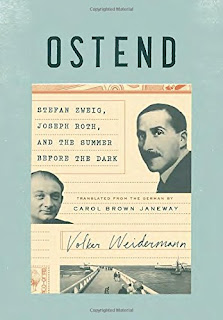Ostend was a popular resort on the Belgian coast. The Austrian author Stefan Zweig was vacationing there in 1914 when a world war was declared. Years later, Zweig invited Joseph Roth, the Austrian journalist, to join him in Ostend during the summer of 1936. Both men were Jews, emigres, and writers, whose books were banned in much of German-speaking Europe. A small colony of fellow writers, all anti-Fascist, was also in Ostend that summer, commiserating in a tranquil haven before the developing storm: The Spanish Civil War began on July 18. Hitler opened the Berlin Olympics on August 1 with hopes of putting a deceptive face on anti-Semitism. A dictatorship was established in Greece on August 4. The first of the Moscow Purge Trials took place on August 19.
Volker Weidermann, the author of Ostend, is a career journalist who has carefully researched this topic. He introduces his cast of celebrated writers, their writings, and their relationships to one another. He has read their letters, diaries, and memoirs. It's as if he was present during conversations, the walks they took together, and the cafes they frequented. His subjects become players in a real-life drama. More than one critic has remarked that Ostend is "as transporting as fiction."
Many of these writers did not survive the war years. Most, and perhaps all, of them may be unfamiliar to Americans. But in Europe they all enjoyed literary prominence on the eve of World War II. They are worth knowing. And today, you can't read Ostend without thinking about the emigre experience unfolding daily in our current news. It is this world of today, however, in which Germany has done so much to extend a welcome to emigres seeking peace, protection, and a new life.

No comments:
Post a Comment